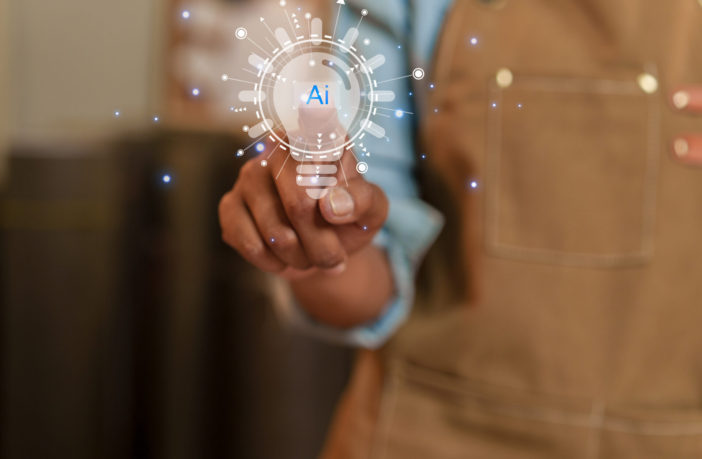by Kevin Payne
May 15, 2024
Originally Published Aug. 23, 2021.
Artificial Intelligence (AI) mimics the cognitive functions of the human mind, particularly in learning and problem-solving. Many of the apps that we use today are powered by AI. From voice-activated virtual assistants to e-commerce, AI applications are everywhere.
With the advancements in AI technology and access to big data, companies across different industries are integrating AI into their processes to find solutions to complex business problems.
The application of AI is most noticeable within the retail and e-commerce space. Websites and apps can interact intelligently with customers, creating a personalized approach that enhances the customer experience.
No matter what industry your business operates in, these seven tips can help you acquire and retain customers more efficiently at a fraction of the time it takes to do things manually.
How to Use AI to Get and Keep Customers
1. Identify Gaps in Your Content Marketing Strategy
If you’re just starting with content marketing, you’ll need to know what type of content to create.
Using AI, you can identify gaps, find fixes, and evaluate the performance of your content marketing campaign.
Take Packlane, a company that specializes in custom package designs, for example. They create high-quality content like helpful blog posts that provide valuable information. At the same time, the content they publish makes it easier for their target market to understand their brand and services.
If you’re in the retail or e-commerce space, you can use AI to identify the gaps in your content marketing. Your content may be focused on your products and their features, but you can determine the relevant content that addresses your audience’s needs and pain points through AI.
2. Pre-Qualify Prospects and Leads
Not every visitor to your site will become a paying customer. If you’re not getting sales despite the massive traffic, it means you’re generating low-quality leads.
Some reasons why this happens include:
Targeting the wrong audience
Poor content marketing strategy
Using the wrong type of signup form
Promoting on the wrong social media platforms
Ineffective calls to action
These mistakes can be rectified with the help of artificial intelligence.
AI tools can extract relevant data to help you learn more about your target audience. These tools also provide predictive analytics on your customers’ behavior. They, in turn, help improve your lead generation strategy because you’ll know which leads to pursue, where to find them, and how to engage them effectively.
3. Provide Personal Recommendations
Brands that tailor their recommendations based on consumer data boost their sales over brands that don’t.
Recommendation systems’ algorithms typically rely on browsing history data, visited pages, and previous purchases. However, AI is so advanced that it can analyze customers’ interactions with site content and find relevant products that interest the individual customer. This way, AI makes it easier to target potential customers and effectively puts the best products in front of the site visitors.
Because of AI, recommendation engines can filter and customize product recommendations based on each customer’s preferences. It’s a cycle of collecting, storing, analyzing, and filtering the available data until it matches the customers’ preferences.
This is an effective way of acquiring and retaining customers because there’s an element of personalization.
4. Reduce Cart Abandonment
A high cart abandonment rate is the bane of e-commerce business owners. According to a study by the Baymard Institute, the rate of online shopping cart abandonment is close to 70%.
Users abandon their online carts for various reasons:
high extra costs
complicated checkout process
privacy concerns
not enough payment methods, or
they’re not ready to buy yet.
Using AI-powered chatbots is one way to reduce cart abandonment. AI chatbots can guide customers through their shopping journey.
AI chatbots can take a conversational approach and give the customer a nudge to prompt them to complete the purchase. These chatbots can also act as a virtual shopping assistant or concierge to let customers know about an on-the-spot discount, a time-sensitive deal, a free shipping coupon, or any other incentives that will encourage them to complete the checkout.
With AI, lost orders due to cart abandonment are recoverable and can lead to an increase in conversion rate for e-commerce businesses.
5. Increase Repurchases With Predictive Analytics
Predictive analytics is the process of making predictions based on historical data using data mining, statistical modeling, artificial intelligence, machine learning, and other techniques. It can generate insights, forecast trends, and predict behaviors based on past and current data.
In marketing, predictive analytics can predict customers’ propensity to repurchase products and their frequency. When used to optimize marketing campaigns, AI-powered predictive analytics can generate customer response, increase repurchases, and promote cross-selling of relevant products.
It’s all part of the hyper-personalized marketing approach, where brands interact and engage with customers and improve their experience by anticipating their needs and exceeding their expectations.
With predictive analytics, you can focus your marketing resources on customer retention and target a highly motivated segment of your market that is more than happy to return and repurchase your products. This approach is less expensive than advertising or implementing pay-per-click campaigns.
6. Improve Your Website User Experience
Every business—big or small—knows the importance of having a website where visitors can interact with the brand, respond to a call to action, or purchase products. But it’s not enough to have an online presence; it’s important that visitors have a great experience while navigating through your site.
What makes for a great user experience? Users have different expectations. Some want faster loading time, while others want a simple and intuitive interface. But most important of all, they want to find what they’re looking for. It could be a product, content, or a solution to a problem. Whatever they may be, it’s up to you to meet their expectations.
With artificial intelligence, you can improve your website user experience tenfold. Here are some of the ways AI can be used to improve user experience.
Search relevance
This pertains to how accurate the search results are in relation to the search query. The more relevant the results are, the better the search experience the users will have. This means they will likely find relevant content to answer their queries or find products that solve their problems.
Personalized recommendations
Content that is tailor-made for the user tends to have greater engagement, which increases the likelihood of conversation. Amazon has perfected the product recommendation system using advanced AI and machine learning. AI uses customer data to gain insights and apply predictive analysis to recommend relevant products for cross-selling opportunities.
AI chatbots
The presence of chatbots contributes to a great user experience because they provide 24/7 assistance and support in the absence of human customer service. Users can get accurate answers to their inquiries quickly and efficiently, compared to scrolling through text-based FAQs.
7. Social Listening for Potential Customers
Social listening is the process of analyzing the conversations, trends, and buzz surrounding your brand across different social media platforms. It’s the next step to monitoring and tracking the social media mentions of your brand and products, hashtags, industry trends, as well as your competitors.
Social listening analyzes what’s behind the metrics and the numbers. It determines the social media sentiment about your brand and everything that relates to it. It helps you understand how people feel about your brand. All the data and information you get through social listening can be used to guide you in your strategy to gain new customers.
Social media monitoring and listening can be done much more efficiently with the help of artificial intelligence. It’s an enormous task for a team of human beings to monitor and analyze data, but with AI-powered social media tools, all the tedious tasks can be automated. They can be trained to leverage data to provide highly accurate insights about your brand.
With AI and machine learning, social listening can easily determine your audience, brand sentiments, shopping behavior, and other important insights. By having this information within reach, you’ll know how you can connect with them more effectively and turn them from prospects to paying customers.
Key Takeaways/Conclusion
More companies across industries use artificial intelligence and machine learning to significantly increase brand awareness, enhance customer engagement, improve user experience, and meet customer expectations.
AI can identify gaps in your content marketing strategy and help you create relevant content for your target audience.
AI can help you generate high-quality leads that will likely buy your products.
With AI, you can personalize and tailor-fit your product recommendations based on your customers’ preferences, increasing repeat purchases.
AI can be integrated into your e-commerce site to reduce shopping cart abandonment.
AI significantly improves website user experience by making it intuitive, accessible, and easy to navigate.
AI-powered social media tools can help you monitor and gain valuable insights about your brand. You can then use this to develop a social media marketing strategy to acquire new customers.
Achieve these milestones, and you’ll be sure to acquire and retain new customers.
RELATED CONTENT: New AI Technology Can Detect Cancer On Mammograms Sooner



